Normothermic Perfusion Technology – First of its kind in Telugu states, an advanced liver preservation system at Yashoda Hospitals
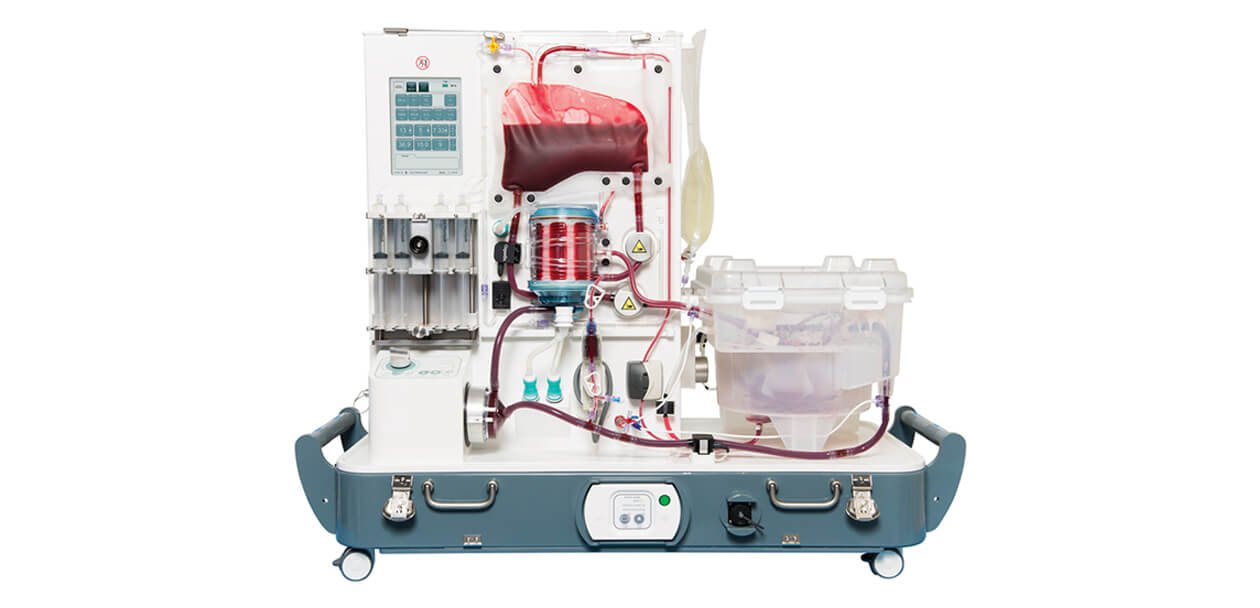
Hyderabad, 10th September 2018: Donor organs save lives and they are very scarce. Until now, the harvested organs had a very short lifespan of 4 to 8 hours before which they had to be transported and transplanted to the recipients. The long-awaited technology to preserve donor liver for up to 24 hours is now here. With normothermic perfusion technology, doctors can now reach out to more patients, surpassing the challenges of time and geographical distances.
Normothermic perfusion technology was used for the first time in the Telugu States by Yashoda Hospitals in Hyderabad. Unveiling this advanced liver preservation technology today, Dr. G. S. Rao, Managing Director, Yashoda Group of Hospitals, said, “It is truly a new leap of advancement in organ transplantations. This equipment preserves liver and its functions so the transplantation window can extend up to 24 hours. So far 3 patients successfully underwent liver transplantation and found a new lease of life using this advanced technology”
Normothermic perfusion system maintains simulated body condition where the blood supply, storage temperature and other vitals are well maintained so the liver remains protected from depletion of cellular energy and accumulation of waste. This increases the window of transplantation to up to 24 hours from the current 4-8 hours, while also allowing for easier access and transportation. This additional time also allows a fair assessment of marginal livers which would otherwise be rejected.
Yashoda Group of Hospitals has successfully accomplished three consecutive cases of marginal liver transplantation at its Center for Hepatobiliary Diseases and Liver Tranplants at Secunderabad. The first liver transplant was from an elderly 67-year-old-male donor with a significant history of alcohol consumption & significantly elevated bilirubin. Ultrasound tests revealed mild-to-moderate fatty liver. The second liver was from a donor with significantly elevated liver enzymes and was on very high pressure support. In a normal scenario, both these livers would have been rejected. But once supported with the normothermic perfusion system, these donor’s livers were tested in real-time and found apt for transplantation. Both the recipients despite being very sick had an uneventful course and quick recovery.
Yashoda Hospitals, Secunderabad, who led the liver transplantation team in performing these path-breaking procedures said, “Cadaver livers are accepted based on results of liver function tests and ultrasound & physical appearance. Many livers undergo rejection and as a result retrieval is not attempted. However, with the normothermic perfusion technology, real time picture of the quality and function of the donated liver are accessed, thus the chances of protection and transplantation of marginal livers are enhanced.” Dr. R. Chandrashekar, Executive Vice President of Yashoda Hospitals added, “Also, the technology provides enough time to stabilize the recipient and transfer liver from harvesting center to the hospital for transplantation.”
The liver transplantation team at Yashoda Hospitals has the collective expertise of over 2000 successful liver transplantations. “The team is presently supporting liver transplantation procedures conducted at international hospitals located in Mayanmar, Mongolia, Georgia, Uzbekistan and Kazakhstan. Presently, we are the hospital with largest transplantation program in Telugu states, Telangana and Andhra Pradesh.”
Dr Hynek Mergental, the consultant liver transplant and multi-organ retrieval surgeon at University Hospital, Barmingham UK explained the utility of this technology in Europe “Normothermic perfusion system is tested and is being used in several european centers. The technology is the product of research and innovation at the University of Oxford, UK.”
In India, 25,000 to 30,000 liver patients are registered for donated livers. Every year, hardly 250 to 300 cadaveric livers are made available of which at least 60 to 90 donated livers are rejected due to either poor quality of liver, liver preservation and lack of timely access or logistic issues. Use of normothermic perfusion system holds promise to improve the successful transplantation of donated liver by 30% which in turn promises more lives saved annually.” said Mr. Craig Andrew Marshall, CEO of OrganOx Ltd. Oxford-UK.
News Coverage
- https://www.thehindu.com/news/cities/Hyderabad/hyderabad-gets-device-to-preserve-liver/article24919598.ece
- http://www.uniindia.com/yashoda-hospitals-introduces-normo-thermic-liver-perfusion-technology-in-liver-transplantation/states/news/1346731.html
- https://telanganatoday.com/donor-livers-shelf-life-pushed-to-24-hours
- https://m.ntnews.com/article/yashoda-hospitals-introduces-normo-thermic-liver-perfusion-technology-in-liver-transplantation-1-2-583899.html/583899
- https://www.deccanchronicle.com/amp/nation/current-affairs/110918/hyderabad-new-technology-to-help-preserve-donor-liver-longer.html
- https://www.thehindu.com/news/cities/Hyderabad/cyec0h/article24919597.ece




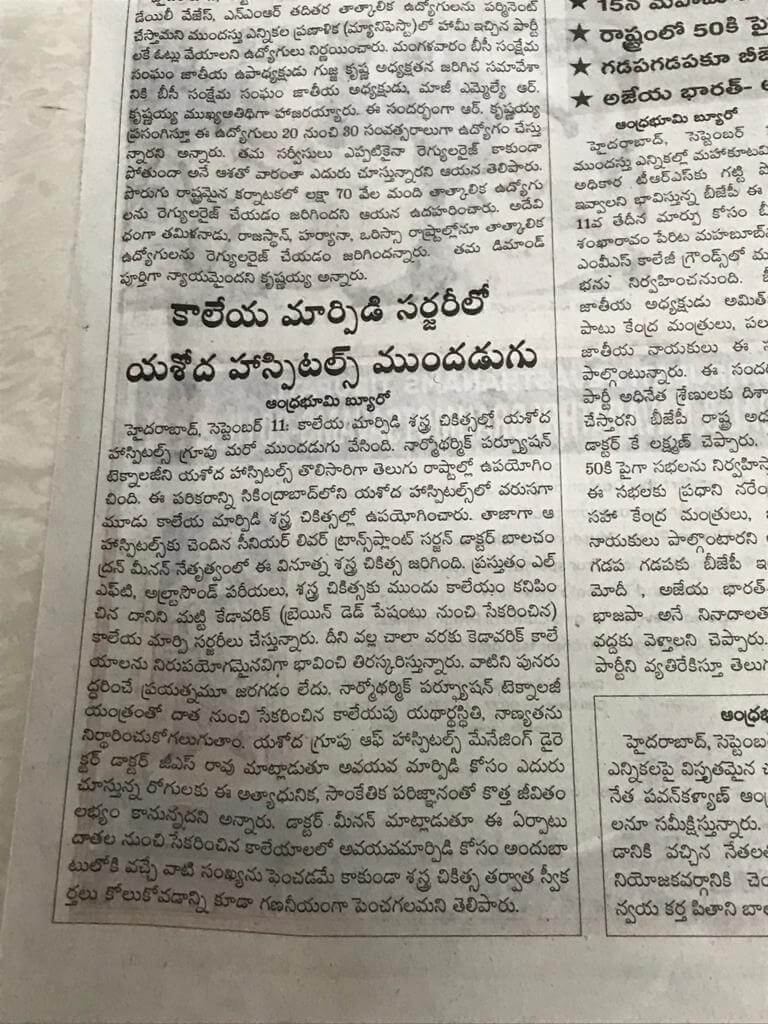
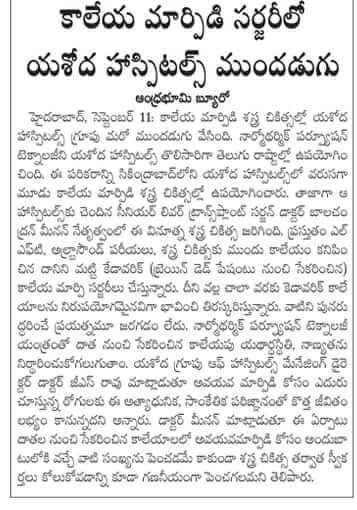
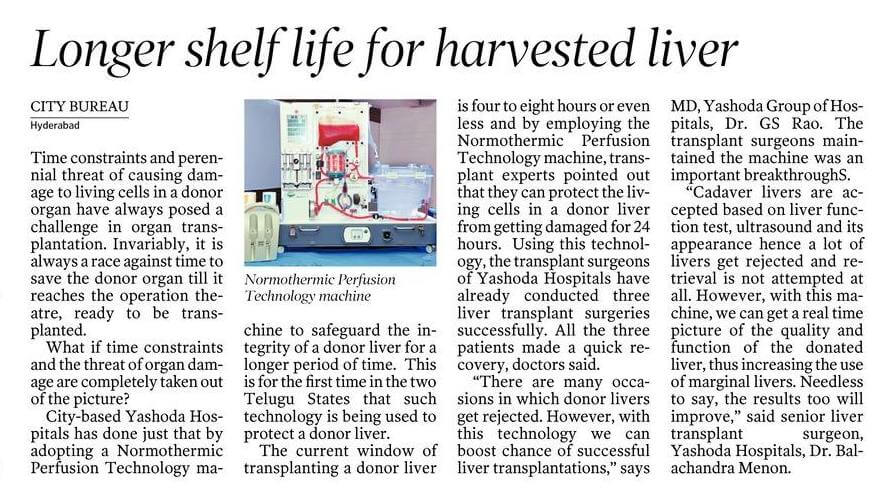
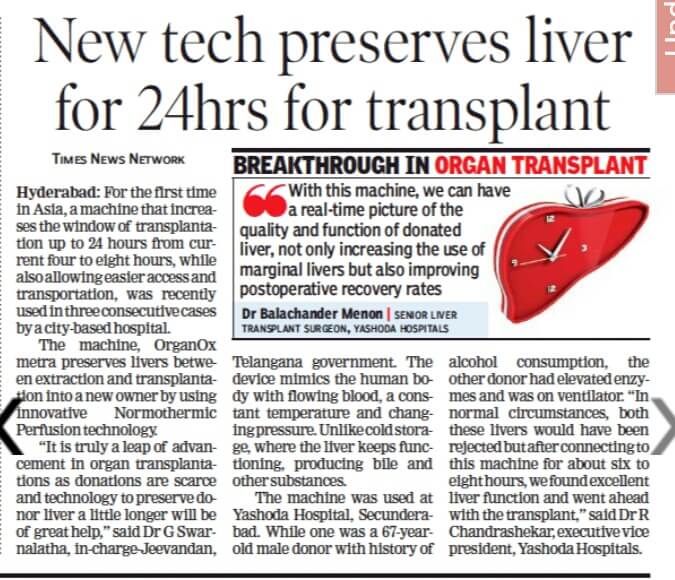
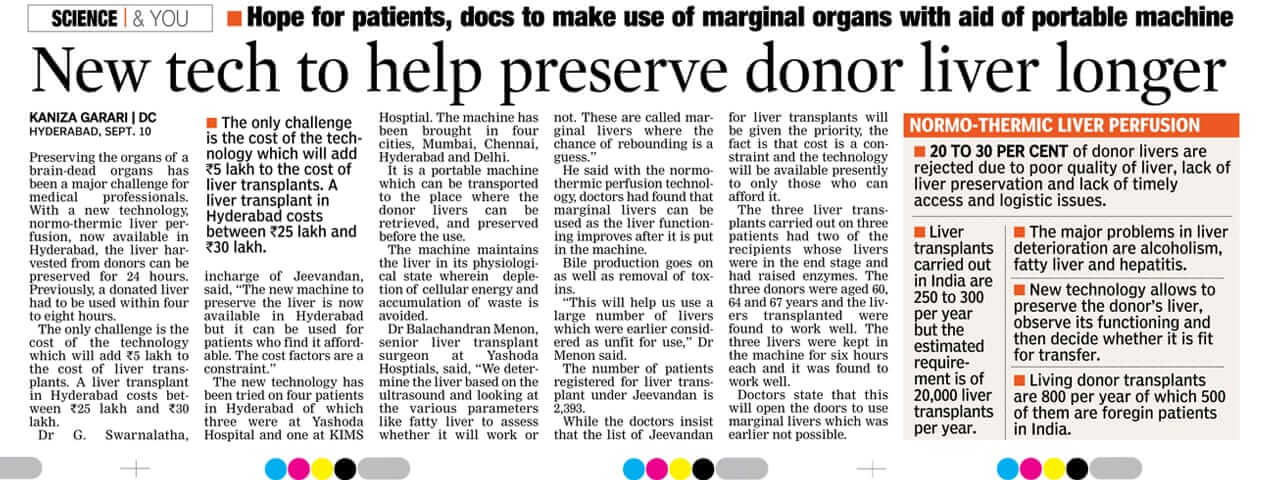
 Appointment
Appointment WhatsApp
WhatsApp Call
Call More
More

